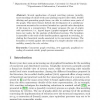Free Online Productivity Tools
i2Speak
i2Symbol
i2OCR
iTex2Img
iWeb2Print
iWeb2Shot
i2Type
iPdf2Split
iPdf2Merge
i2Bopomofo
i2Arabic
i2Style
i2Image
i2PDF
iLatex2Rtf
Sci2ools
101
click to vote
CONCUR
2006
Springer
2006
Springer
Concurrent Rewriting for Graphs with Equivalences
Several applications of graph rewriting systems (notably, some encodings of calculi with name passing) require rules which, besides deleting and generating graph items, are able to coalesce some parts of the graph. This latter feature forbids the development of a satisfactory concurrent semantics for rewrites (intended as a partial order description of the steps in a computation). This paper proposes the use of graphs with equivalences, i.e., (typed hyper-) graphs equipped with an equivalence over nodes, for the analysis of distributed systems. The formalism is amenable to the tools of the double-pushout approach to rewriting, including the theoretical results associated to its concurrent features. The formalism is tested against the encoding of a simple calculus with name mobility, namely the solo calculus.
CONCUR 2006 | Distributed And Parallel Computing | Graph Rewriting Systems | Partial Order Description | Satisfactory Concurrent Semantics |
Related Content
| Added | 20 Aug 2010 |
| Updated | 20 Aug 2010 |
| Type | Conference |
| Year | 2006 |
| Where | CONCUR |
| Authors | Paolo Baldan, Fabio Gadducci, Ugo Montanari |
Comments (0)

